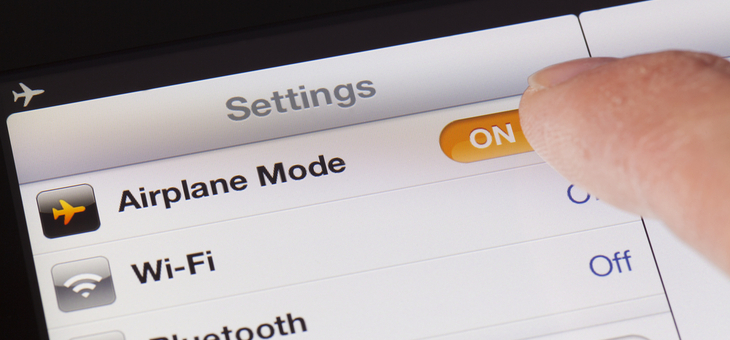Matthew has been on plenty of flights where he has seen people using their phones with abandon and none have fallen from the skies. He wants to know if it is a con.
—
Q. Matthew
I have been flying for a while now and I’ve seen people using their phones both in flight mode and as normal, and I have yet to see a plane fall out of the sky. Is using your phone in flight mode really necessary and can it really interfere with navigation or cause problems on flights?
A. The truth is the Civil Aviation Safety Authority (CASA) has no specific rules about electronic devices, but it does leave the decision at the discretion of the flight operators.
It is accepted practice for Australian airlines to ask passengers to use flight mode to minimise any risk, but international airlines are able to play by their own rules, which may explain why you have seen some passengers using their phone in standard mode.
Read more: Will this solve the problem of sleepless economy flights?
According to CASA, you can use your mobile phone or other personal electronic devices without compromising safety standards as long as you follow onboard procedures.
CASA explains that the operator has the final say about the type of devices you can take on board and the conditions of use on board their aircraft.
Electronic devices are able to transmit three different signals: mobile telephone, wifi, and Bluetooth. Flight mode disables all transmitting functions.
Read more: Air safety features hidden in plain sight
Many operators offer wifi streaming for in-flight entertainment or internet connectivity, but most mobile phone functions are not permitted in flight.
Clearly, though, aircraft navigation systems are very robust. If a plane could be brought down by people using their phone on a flight it would make a mockery of all the security checks that passengers have to go through to get onto the flight.
However, just because a phone hasn’t been responsible for causing interference and there are no documented cases where interference from a device has caused a crash, that doesn’t mean that it isn’t possible.
Read more: How we can make better use of Australian airports
While a device is unlikely to crash a plane, it can do enough to annoy pilots and air traffic controllers. This is because mobile phones increase their power usage the further they get from a signal tower.
As you get higher from the ground, your phone power increases accordingly as it tries to communicate effectively. This increase in power causes radio emissions that can make a very unpleasant noise through the audio system that pilots and air traffic controllers use to communicate.
One person who has left their phone on doesn’t cause too much disturbance on the channel, but the more phones that are turned on the louder and more disruptive the interference.
There is another very good reason to switch your phone to flight mode when flying. If you don’t switch to aeroplane mode, your phone may automatically connect to the aircraft’s antenna which, in turn, connects to roaming networks, often via satellite, which is much more expensive than land-based networks. This can end up costing you quite a bit of money in roaming charges.
If you see a passenger using their phone in normal mode when they have been instructed not to, CASA advises telling the cabin crew immediately.
“If you notice the unlawful activity happening at a critical phase of flight, such as during take-off or landing when all cabin crew must be seated, you can raise it with the cabin crew as you disembark from the aircraft,” CASA explains.
“Pass over your contact details, the seat that the other passenger was in and a short summary of what you saw.
“The airline will take your safety concerns seriously and might contact you for more information. They’ll also respect your privacy.
“In most circumstances, they’ll contact the offending passenger, educate them and record their details for further action in case of a repeat of this type of behaviour.”
Have you ever left your phone on during a flight? Have you seen other passengers using their devices on a flight when they have been told not to? Did you do anything about it?
If you enjoy our content, don’t keep it to yourself. Share our free eNews with your friends and encourage them to sign up.

